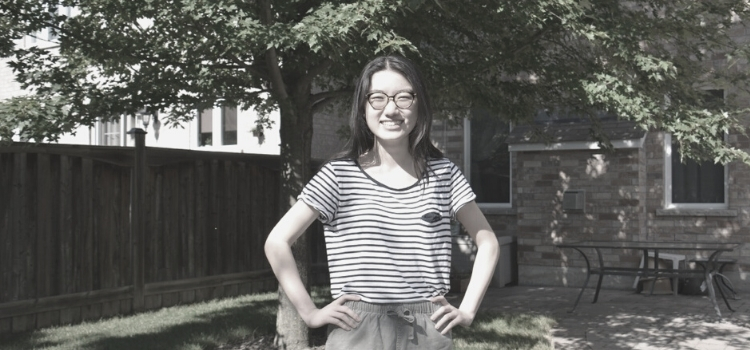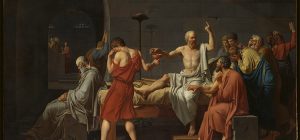
Elizabeth Zhu is a name to remember. Last year, as a 16-year-old Grade 11 student, Elizabeth genuinely impressed the judges with her submission to the 2019 Aristotle Contest, an annual essay-writing competition co-hosted between U of T’s Department of Philosophy and OPTA, the Ontario Philosophy Teachers’ Association. The adjudicating committee noted an inspired combination of cogent argumentation and beautiful prose in Elizabeth’s “Reality Is a Shared Hallucination,” awarding her first prize (which comes with a $500 recognition) among a strong field of competitors. One year later, the committed debater continues to breathe philosophy, not only co-organizing a free online debate camp for youth stuck at home during this pandemic summer but also launching a website and journal aimed at engaging high school students with philosophical thinking. We talked to her via Zoom to get an update on her projects.
Thank you, Elizabeth, for agreeing to answer a few questions. Please briefly introduce yourself.
I’m happy to do so! I’m Elizabeth, a rising senior at the University of Toronto Schools. I’m interested in philosophy, specifically moral philosophy and epistemology. I’m planning on majoring in either philosophy or economics in university, most likely with a minor in the other.
The last time our readers heard from you, in the fall of last year, you had just won the 2019 Aristotle Contest with your essay titled “Reality Is a Shared Hallucination.” What have you been up to since then?
Since then, the world has taken quite a turn! I’m currently doing an internship in behavioural economics at Rotman, and our team is drafting a report/playbook for TD Wealth. We are analyzing behavioural finance from the lens of different segments—for example, women, Indigenous people, or persons with disabilities. Besides attending meetings for the internship, I’ve been experimenting with some projects on the side. I’m co-running an online, entirely free debate camp (@globaldebatecamp) for two weeks in early August, so it was a lot of work (and excitement!) putting the finishing touches on the curriculum and logistics of the camp. I’m in the process of setting up an economics qualifier with a few other high school students. Most excitedly, I set up a platform called Dialexicon, which is designed to engage youth in philosophical writing and discussion!
Since we are doing this interview in 2020, I must ask you: What has your experience of the coronavirus pandemic been, both personally and in terms of your studies?
I’ve been lucky to not know any relatives or close friends who’ve contracted Covid-19, and can’t imagine the personal ordeal. The pandemic has changed my studies a bit, with online classes and exams, but nothing too drastic considering we live in a digital age. Being in lockdown has been interesting—it’s given me a lot of time to pursue projects, but it’s also a lot easier to get distracted when you’re at home all the time, which I’m guilty of. I miss my friends too.
You are a competitive debater, and just finished a tournament last month. How did you get into this pastime and what impact would you say it has had on your life?
I started debating when I was in Grade 8 and continue to do it as a rising senior. My school has a well-established debate society, so I was fortunate to have invaluable coaches and older students to look up to when I first started as a timid, introverted kid. I enjoy debating because it is intellectually stimulating and forces you to consider various sides of an issue, rather than passively accept your ingrained beliefs or societal norms. Debating introduced me to philosophy, since almost every argument has a philosophical basis. For example, motions where a government might be banning a certain thing raises issues of autonomy and political philosophy.

Jacques-Louis David, “Death of Socrates” (1787), in the public domain. Elizabeth Zhu uses the painting for her newly created website for high school philosophy enthusiasts.
What do you consider the most challenging aspect of making a good argument? And what the most thrilling?
The most challenging part about good argumentation for me is walking the judge through every link in your argument so that it can withstand rebuttal. Many principled arguments rely on our intuitions; for example, many of us uphold choice as an intuitive right, but it can be hard to explain those intuitions and analyze them on a deeper level, beyond rhetoric. I think the most thrilling part about making arguments is meta-debating, which involves a debate within a debate as you weigh the strategic importance of the argument in the round and explain why it wins the debate.
You have recently created a philosophy website/journal for high school students, Dialexicon. Tell us a little bit about the project.
Of course! Dialexicon is a platform for youth to engage in philosophy. It consists of a forum to discuss philosophical issues, a series of webinars with philosophy professors, and a youth philosophy journal that will soon be accepting submissions from middle and high school students. The idea for Dialexicon popped into my head late at night, out of the blue, when I was thinking about how barely any of my friends were interested in philosophy to the extent that I was (understandable, they would much rather be doctors). After doing a bit of research, I couldn’t find an organization in Canada dedicated to engaging, educating, and providing youth a platform to discuss philosophy. I was excited, so I emailed our school’s philosophy teacher and you, and here we are! I think Dialexicon is important because among Generation Z, philosophy has become a bit of a forgotten art, associated with old professors lounging in their armchairs in ivory towers puffing on a cigarette. Not many young people read Plato or Camus, which I think is regrettable since past philosophers shape the basis of modern-day society, and reading these works fosters critical thinking, emotional maturity, and allows us to better understand our place in the world.
Is philosophy for everyone? Why?
For sure. I think regardless of what you do in life, philosophy is useful. At some point, everyone is going to be faced with a philosophical dilemma of some sort. You can’t eat meat without considering at least once what the ethical implications are, similar to how you don’t pay taxes without thinking about what obligations you owe to the state and vice versa. Even branches like metaphysics are about asking the big questions that shape our lives, which isn’t always immediately practical, but I think everyone gets a bit of joy from asking these questions. I like to think of philosophy not so much as a field, but as a way of continuously looking at the world. That’s the purpose of the Dialexicon journal—to look at philosophy from a political lens, an economic lens, examining the importance of philosophy in relation to STEM, and so on. You can be passionate about different fields, but everyone can apply philosophical thinking to their life.
What can one find you doing when you are not wrangling ideas and arguments?
Lockdown has gotten me watching a lot of movies and reading books. I loved Whiplash and The Truman Show. They incorporate surprising amounts of philosophy.
What are your plans for the future?
I’m honestly not too sure. I find out where I’m going to university next year, so my plans are probably going to adjust based on that! I plan on majoring in economics or philosophy, depending on how practical I’m feeling. Perhaps I’ll even double-major in the two. In the future, I’d love to work in developmental economics, academia, or in consulting. As you can tell, I’m not too set on a specific career, and I’m not sure what the future holds!
SHARE
